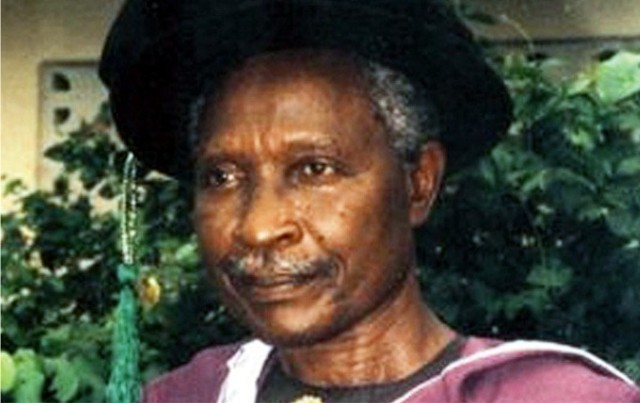Opinion
A Tribute To Elechi Amadi

I feel fortunate to have met Captain Elechi Amadi:
first like his numerous literary fans all over the world, through his writing. Elechi Amadi was a significant writer and gifted story teller, that occupied the category of contemporary African fiction that began as part of what became the “Heinemann African writers series: Chinua Achebe’s famous Things Fall Apart (1958); Ousmane Sembene God’s Bits of Wood (1960); Ngugi wa Thiongo’s The River Between (1965) and Ayi Kweyi Armah’s classic, The Beautiful Ones Are Not Yet Born (1968) to mention some of my favourites in the series.
I read these great novels in early 1970s along with Elechi Amadi’s own critically acclaimed first novel, with its suitably titillating title -The Concubine (1966) and also The Great Ponds (1969). I had been a keen student of “English Literature” which my ‘0’ and ‘A’ level literature courses were inappropriately called, rather than “Literature in English” which they in fact entailed.
In 2012, I was privileged to have been invited by Mrs Koko Kalango, founder of the Rainbow Book Club, Port Harcourt, to read and discuss excerpts from Elechi Amadi’s The Great Ponds, the story of a battle between two village communities over possession of a pond, to selected school children, as part of her selfless and commendable drive to promote a reading culture amongst our youth and an appreciation for literature.
I, however, only met Captain Elechi Amadi in person for the first time 30 years after my first encounter through his novels, in 2003, when I was privileged to have been invited by Sir Dr Peter Odili (KSC) to serve as Attorney General of Rivers State, in his second term cabinet. Through that fortuitous meeting, perhaps even unknown to him, he became a mentor of sorts.
As part of our orientation as commissioners, a seminar was organised to acquaint us all newly appointed public servants with our new roles and the expectations of us. One of the speakers who distinctly influenced my subsequent eight years in public service was Captain Elechi Amadi, who shared with us his own experiences and personal choices as a public servant. First, he strongly articulated and advocated values of honesty and integrity and was himself a role model of probity in public life, a model public servant.
Secondly, he urged us, to the extent possible, to keep our doors open to the public who we had been appointed to serve. We were public servants and the public – literally – had to have access to us!! He warned that it wasn’t easy to accomplish that, but that he had done so in all the high public offices he had occupied in the State, as Commissioner for Education (1987-88) and as Commissioner for Lands and Housing (1989-90). He was passionate and persuasive and I resolved then to do likewise. I’m proud to look back today and say that because of Captain Elechi Amadi’s inspiring intervention, I strove to do so, throughout my tenure of the various public offices I held.
Through his writing and lifestyle, he embodied the ethos of Africa’s traditions, cultures, community, sensitivity and simplicity that he sought to vividly depict in his novels. He used the medium of his writing to highlight the universality of history and culture, but also to entertain.
It is not often that a man who had taken a degree in Physics and Mathematics at the University of Ibadan, as Elechi Amadi did between 1955 and 1959, should come to serve as a lecturer at Rivers State College of Education, Dean of Arts and Head of the Literature Department and Director of General Studies, just a decade later, in the late sixties and early seventies.
This simply highlighted his brilliance, versatility and passion to follow his true calling.
A soldier, statesman, administrator, author and poet who began life as a teacher at the Nigerian Military School, Zaria between 1963 and 1966, Captain Elechi Amadi witnessed firsthand the unfolding and sadly still unresolved Nigerian political crises of 1965 to 1967 and subsequent Civil War, which he documented in another literary masterpiece Sunset in Biafra (1973)
As we mourn the passing of this great Nigerian writer, we acknowledge his legacy of distinction in the several spheres of endeavour that he explored with his prodigious talent, in the course of an undoubtedly fulfilled and exemplary life.
Ajumogobia (SAN) is former Rivers State Attorney-General and Commissioner for Justice, former Minister of State for Petroleum Resources and former Minister of Foreign Affairs.
Odein Ajumogobia
Opinion
Righteous Leadership Still Thrives

Opinion
Incentives: Key to Police Morale

Opinion
Time and Season Can Tell

-

 News2 days ago
News2 days agoAmend Constitution To Accommodate State Police, Tinubu Tells Senators
-

 Politics2 days ago
Politics2 days agoSenate Urges Tinubu To Sack CAC Boss
-

 News2 days ago
News2 days agoDisu Takes Over As New IGP …Declares Total War On Corruption, Impunity
-
Business2 days ago
President Tinubu Extends Raw Shea Nuts Export Ban To 2027
-
Business2 days ago
Crisis Response: EU-project Delivers New Vet. Clinic To Katsina Govt.
-
Business2 days ago
President Tinubu Approves Extension Ban On Raw Shea Nut Export
-
Rivers2 days ago
Etche Clan Urges Govt On Chieftaincy Recognition
-
Sports2 days ago
NDG: Rivers Coach Appeal To NDDC In Talent Discovery

